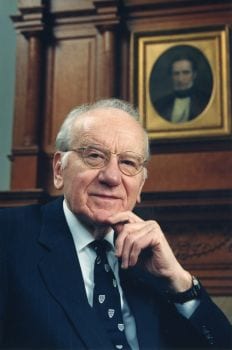
“Sometimes I feel like Sir James Murray must have felt while he was grubbing away at writing the Oxford English Dictionary,” the Washington Post once quoted Victor McKusick as saying. “He managed to complete the first 17 letters before he died.”
When McKusick, University Professor of Medical Genetics at Johns Hopkins University School of Medicine, the so-called “Father of Genetic Medicine” and a key architect of the Human Genome project died on July 22, his own magnum opus, the online Mendelian Inheritance in Man (OMIM) database, had nearly 19,000 entries.
The man who wrote the bible of medical genetics attended Tufts University and then entered Johns Hopkins Medical School without finishing college.
“Part of my reverse snobbery is that I was a college dropout, that I don’t have a bachelor’s degree,” McKusick observed during a 2001 interview. “I have twenty-one honorary doctorates in addition to my M.D., but no bachelor’s degree.”
Once he got into Johns Hopkins in 1943, McKusick never left. He started his medical career as a cardiologist because, he said, medical genetics didn’t exist as a field then.
“The problems presented by hereditary disorders were intellectually tremendously challenging, and that was part of the reason I was interested in them,” he said during a 2001 interview. “It was obviously necessary to get at root causes in the terms of biochemical defects and, eventually, DNA defects.”
His interest in genetic disorders such as Marfan Syndrome led to studies involving the Old Amish in Pennsylvania, and eventually fostered a need to compile not just an annual review of genetic research done thus far, but to provide “a comprehensive compendium of all the information up to a given point.”
That compendium was the Mendelian Inheritance of Man or MIM, which went through 12 editions in print before the sheer number of entries rendered volumes unwieldy. In 1987, the online MIM, which McKusick and his colleagues continued to edit on a daily basis, became available to the public. By 2000, OMIM had 1,000 gene entries where at least one version of a gene had been linked with a human phenotype.
In 1968, McKusick published a Proceedings of the National Academy of Sciences paper in which he mapped the Duffy blood group locus to chromosome 1. The following year he began campaigning for a map of the human genome, and saw the full DNA sequence completed in 2001.
McKusick received the 1997 Albert Lasker Award for Special Achievement in Medical Science and the 2001 National Medal of Science. Earlier this year he was awarded the Japan Prize in medical genomics and genetics from the Science and Technology Foundation of Japan. And for nearly 50 years he was co-director of the Short Course in Medical and Experimental Mammalian Genetics, a two-week summer course held at The Jackson Laboratory in Bar Harbor, Maine.
He also foresaw the promise of genome-based medical care. “On the traditional turf of clinical medicine diagnosis will become more specific and precise, and treatment also more specific and safer,” McKusick wrote in a 2001 JAMA paper. “Better understanding of individual genomic constitutions should permit drug therapy to get away from the one-size-fits-all approach. It should allow selection of drugs likely to be more effective in the treatment of a given disorder in a given individual.”
At the end of an interview for the Oral History of Human Genetics Project, McKusick talked about the opportunities he’d had to work on so many intriguing topics, ultimately comparing the scope of his work to that of Sir Isaac Newton.
“Of course, to compare my career with that of Isaac Newton is absurd,” he noted, “but he [Newton] says that he feels like a small boy playing on the beach and picking up an occasional pebble that is smoother and brighter in color than the rest while all the great mysteries of the ocean go unexplored. He’s just picking up a little stone here and there. So I feel like an unabashed dilettante, as well as a chauvinist and opportunist.”
Image from: Johns Hopkins Medicine




